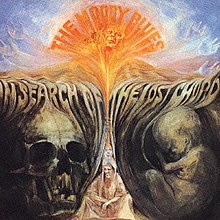In Search of the Lost Chord
| In Search of the Lost Chord | ||||
|---|---|---|---|---|
 |
||||
| Studio album by The Moody Blues | ||||
| Released | 26 July 1968 | |||
| Recorded | January – June 1968 at Decca Studios, West Hampstead, London | |||
| Genre | Progressive rock, psychedelic rock | |||
| Length | 42:07 | |||
| Label | Deram | |||
| Producer | Tony Clarke | |||
| The Moody Blues chronology | ||||
|
||||
| Singles from In Search of the Lost Chord | ||||
|
||||
| Professional ratings | |
|---|---|
| Review scores | |
| Source | Rating |
| AllMusic | |
| Rolling Stone | (mixed) |
In Search of the Lost Chord is the third album by The Moody Blues, released in July 1968 on the Deram label.
Sessions for the album commenced in January 1968 with the recording of Thomas's "Legend of a Mind". The song's title does not appear in the lyrics, which are about LSD advocate Timothy Leary.
In Search of the Lost Chord is a concept album around a broad theme of quest and discovery, including world exploration ("Dr. Livingstone, I Presume"), music and philosophy through the ages ("House of Four Doors"), lost love ("The Actor"), spiritual development ("Voices in the Sky"), knowledge in a changing world ("Ride My See-Saw"), higher consciousness ("Legend of a Mind"), imagination ("The Best Way to Travel"), and space exploration ("Departure"). Space exploration would go on to become the theme of the Moodies' 1969 album To Our Children's Children's Children, inspired by and dedicated to the Apollo 11 mission. The mysterious "lost chord" of the title is revealed to be the mantra "Om" (in the last stanza of Graeme Edge's poem "The Word"). According to keyboardist Mike Pinder, the title was inspired by Jimmy Durante's humorous song, "I'm the Guy that Found the Lost Chord," itself a reference to The Lost Chord by Sir Arthur Sullivan.
...
Wikipedia
